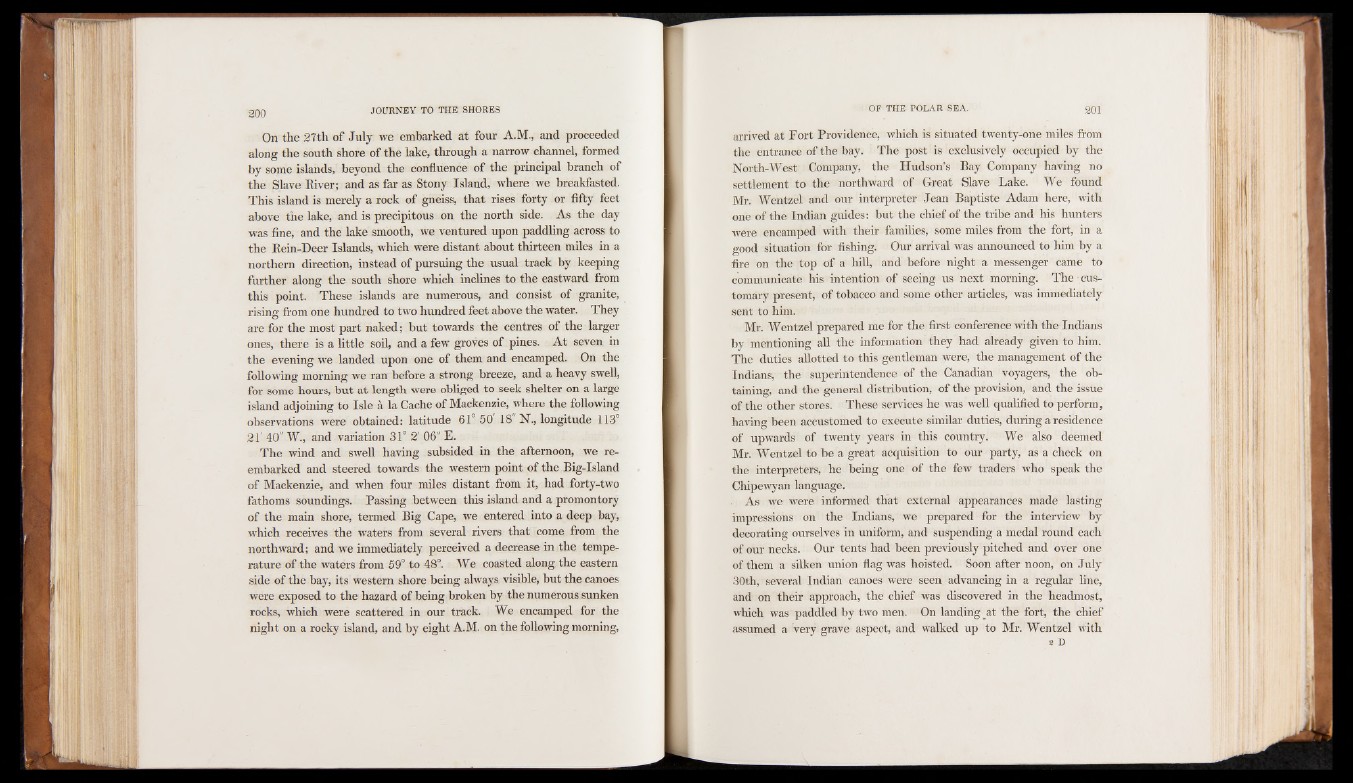
On the 27th of July we embarked at four A.M., and proceeded
along the south shore of the lake, through a narrow channel, formed
by some islands, beyond the confluence of the principal branch of
the Slave Eiver; and as far as Stony Island, where we breakfasted.
This island is merely a rock of gneiss, that rises forty or fifty feet
above the lake, and is precipitous on the north side. As the day
was fine, and the lake smooth, we ventured upon paddling across to
the Rein-Deer Islands, which were distant about thirteen miles in a
northern direction, instead of pursuing the usual track by keeping
further along the south shore which inclines to the eastward from
this point. These islands are numerous, and consist of granite,
rising from one hundred to two hundred feet above the water. They
are for the most part naked; but towards the centres of the larger
ones, there is a little soil, and a few groves of pines. At seven in
the evening we landed upon one of them and encamped. On the
following morning we ran before a strong breeze, and a heavy swell,
for some hours, but at length were obliged to seek shelter on a large
island adjoining to Isle a la Cache of Mackenzie, where the following
observations were obtained: latitude 61° 50 18 N., longitude 113°
21' 40" W., and variation 31° 2' 06" E.
The wind and swell having subsided in the afternoon, we reembarked
and steered towards the western point of the Big-Island
of Mackenzie, and when four miles distant from it, had forty-two
fathoms soundings. Passing between this island and a promontory
of the main shore, termed Big Cape, we entered into a deep bay,
which receives the waters from several rivers that come from the
northward; and we immediately perceived a decrease in the temperature
of the waters from 59° to 48°. We coasted along the eastern
side of the bay, its western shore being always visible, but the canoes
were exposed to the hazard of being broken by the numerous sunken
rocks, which were scattered in our track. We encamped for the
night on a rocky island, and by eight A.M- on the following morning,
arrived at Fort Providence, which is situated twenty-one miles from
the entrance of the bay. The post is exclusively occupied by the
North-West Company, the Hudson’s Bay Company having no
settlement to the northward of Great Slave Lake. We found
Mr. Wentzel and our interpreter Jean Baptiste Adam here, with
one of the Indian guides: but the chief of the tribe and his hunters
were encamped with their families, some miles from the fort, in a
good situation for fishing. Our arrival was announced to him by a
fire on the top of a hill, and before night a messenger came to
communicate his intention of seeing us next morning. The customary
present, of tobacco and some other articles, was immediately
sent to him.
Mr. Wentzel prepared me for the first conference with the Indians
by mentioning all the information they had already given to him.
The duties allotted to this gentleman were, the management of the
Indians;-- the superintendence of the Canadian voyagers, the obtaining,
and the general distribution, of the provision, and the issue
of the other stores. These services he was well qualified to perform,
having been accustomed to execute similar duties, during a residence
of upwards of twenty years in this country. We also deemed
Mr. Wentzel to be a great acquisition to our party, as a check on
the interpreters, he being one of the few traders who speak the
Chipewyan language.
As we were informed that external appearances made lasting
impressions on the Indians, we prepared for the interview by
decorating ourselves in uniform, and suspending a medal round each
of our necks. Our tents had been previously pitched and over one
of them a silken union flag was hoisted. Soon after noon, on July
30th, several Indian canoes were seen advancing in a regular line,
and on their approach, the chief was discovered in the headmost,
which was paddled by two men. On landing at the fort, the chief
assumed a very grave aspect, and walked up to Mr. Wentzel with